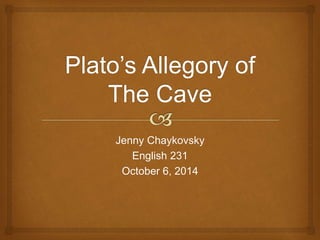
Plato’s allegory of the cave
- 1. Jenny Chaykovsky English 231 October 6, 2014
- 2. Introduction Plato's Allegory of the Cave is not the rosiest take on the reality of human existence. It envisions the world as a dark cave, human beings as trapped prisoners, and all of our experiences as nothing but shadows on a wall. According to Plato's allegory of the cave, the way we perceive things around us and the way we lead our lives, is actually not the "truth". We human beings are leading ignorant, incomplete lives, following the paths, rules, norms, ethics, set by the previous generations, without questioning them.
- 3. Imagery
- 4. Question? Why was the Plato's allegory of the cave written?? The son of a wealthy and noble family, Plato (427-347 B.C.) was preparing for a career in politics when the trial and eventual execution of Socrates (399 B.C.) changed the course of his life. He abandoned his political career and turned to philosophy, opening a school on the outskirts of Athens dedicated to the Socratic search for wisdom. The Allegory presents, in brief form, most of Plato's major philosophical assumptions: his belief that the world revealed by our senses is not the real world but only a poor copy of it, and that the real world can only be apprehended intellectually.
- 5. Connection/Themes There are several themes represented in the allegory of the cave. One of the first themes you come across while reading the Allegory of the Cave is ignorance. The chains binding them to the cave could merely be interpreted as a metaphor for ignorance, as if they wanted to fulfil enlightenment, all they would have to do is ask questions and seek the truth
- 6. Life/Academic Experience Plato makes a good point we often do lead incomplete lives following rules, the norms, etc. Sometimes we get so boxed in doing the same thing over and over again not only do we age ourselves beyond our years, but we miss out on the pleasures and joys of life. Life is meant to be lived, to be creative and think outside the box. The prisoners in the cave have innate conceptions of the forms (according to Plato), so they understand what the shadows on the wall are as they use their natural inclination. However, the guards misguide their understanding of the world and the shadows as they see it in an imperfect light in its material form. Due to ignorance, they believe the shadows on the wall are reality, and they attach exterior noises to what they see on the dark cave walls.
- 7. “My opinion is that in the world of knowledge the idea of good appears last of all and is seen only with an effort, and when seen, is also inferred to be the universal author of all things beautiful and right, parent of light and of the lord of light in this visible world.” People are born blind and do not have the capacity to see. Those with freewill have sight, but can abandon it by shutting their eyes.
- 8. Conclusion Open your eyes to the world around you. Get in the habit of seeing in the dark. When you have acquired the habit, you will see ten thousand times better than the inhabitants of the den. You will see truth and beauty.
- 9. Works Cited http://www.shmoop.com/the-republic/cave-allegory. html http://www.buzzle.com/articles/allegory-of-the-cave-summary. html http://www.historyguide.org/intellect/allegory.html http://www.studymode.com/essays/The-Themes- Adresses-In-The-Allegory-1203301.html